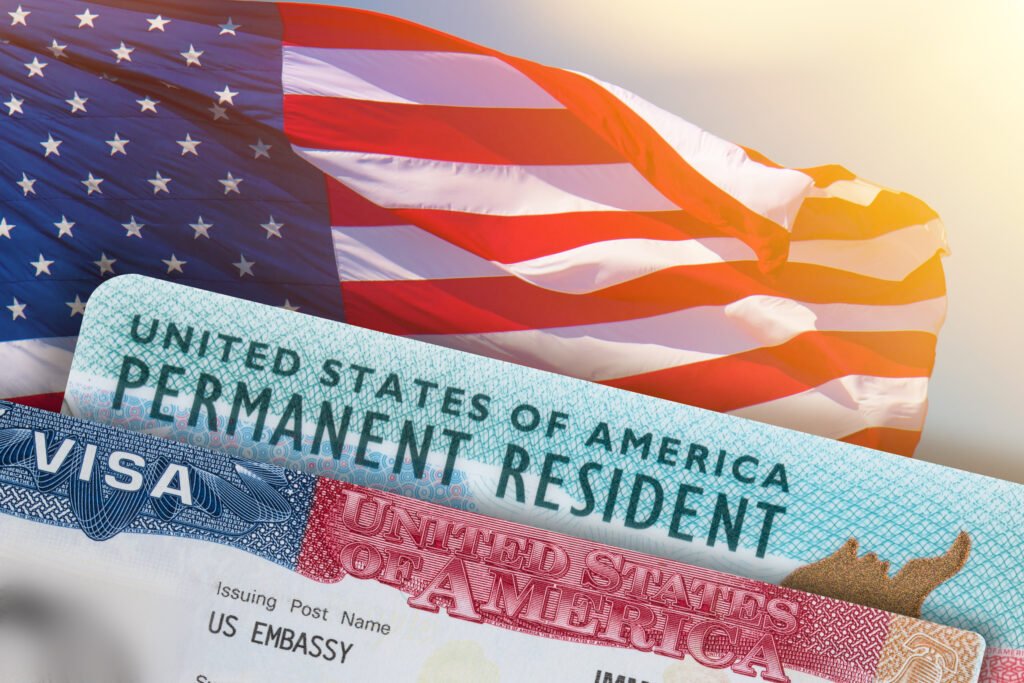
At Suday Law, we often hear the question: “What’s the difference between a Permanent Resident Card and a Green Card?” It’s a fair question, especially for immigrants trying to understand the legal landscape of U.S. residency. The terms are frequently used interchangeably, which can cause confusion for individuals navigating the immigration process.
Terminology: Are They Really Different?
Let’s get straight to the point: there is no legal difference between a Permanent Resident Card and a Green Card. These are two terms for the same document. “Green Card” is the informal, commonly used term, while “Permanent Resident Card” is the official name used by the United States Citizenship and Immigration Services (USCIS).
Origins of the Terms
- Green Card: This nickname dates back to the original version of the card, which was, in fact, green when it was first introduced in the 1940s. The name stuck, even though the color has changed over the years.
- Permanent Resident Card: This is the legal and official designation used by the U.S. government. It more precisely describes the cardholder’s immigration status—lawful permanent residency.
In practical terms, if someone says they have a Green Card, they mean they have a Permanent Resident Card, and vice versa.
What Is a Green Card (Permanent Resident Card)?
A Green Card or Permanent Resident Card is proof that a non-U.S. citizen has been granted lawful permanent resident (LPR) status in the United States. This status allows them to live and work in the U.S. indefinitely, though it does not confer U.S. citizenship.
Key Features of a Green Card:
- Issued by: U.S. Citizenship and Immigration Services (USCIS)
- Validity: Typically 10 years (for permanent residents) or 2 years (for conditional residents)
- Proof of: Lawful Permanent Resident status
- Purpose: Identifies the holder as someone who can live and work in the U.S. permanently
So when people talk about “getting their Green Card,” they are referring to being granted permanent resident status and receiving the official card to prove it.
Types of Permanent Resident Cards
Although the term “Green Card” covers all types of lawful permanent residence, there are different classifications under the same umbrella:
1. Regular (10-Year) Green Card
This is issued to individuals who have been granted permanent residency without conditions. It is valid for 10 years and must be renewed before expiration.
2. Conditional Green Card (2-Year Validity)
Issued to certain immigrants, such as those married to a U.S. citizen for less than two years or entrepreneurs investing in the U.S. economy through the EB-5 visa program. Conditional residents must apply to remove the conditions within 90 days of expiration to receive a standard 10-year Green Card.
3. Employment-Based Green Cards
Issued to individuals sponsored by U.S. employers, usually under the EB (Employment-Based) preference categories.
4. Family-Based Green Cards
Granted to immediate relatives of U.S. citizens or lawful permanent residents, including spouses, parents, and children.
What Rights Does a Green Card Holder Have?
Whether it’s called a Green Card or a Permanent Resident Card, the rights of the holder are the same. A lawful permanent resident in the U.S. has the right to:
- Live and work in the United States on a permanent basis
- Own property
- Attend public schools and colleges
- Apply for a driver’s license in the state of residence
- Receive Social Security and Medicare benefits (after meeting work and age requirements)
- Travel outside the U.S. and return, subject to certain restrictions
- Sponsor certain relatives for their own Green Cards
However, there are also responsibilities that come with permanent residency:
- Maintain permanent residency status by living primarily in the U.S.
- File U.S. income tax returns
- Obey all federal, state, and local laws
- Carry proof of status (i.e., your Green Card) at all times
Can You Lose a Green Card?
Yes. Despite being called a permanent resident, Green Card status is not unconditional. You can lose your status if:
- You abandon your residency (e.g., by living abroad for extended periods without a reentry permit)
- You commit certain crimes that make you removable under U.S. immigration law
- You fail to renew your card
- You fail to file tax returns as a resident, or claim “nonresident” status on your taxes
Additionally, if a conditional permanent resident does not timely file Form I-751 (Petition to Remove Conditions on Residence) or Form I-829 (for EB-5 investors), they can also lose their Green Card.
Renewing vs. Replacing a Green Card
If your card is expired or will expire within the next six months, you need to renew it by filing Form I-90 with USCIS. If your card is lost, stolen, or damaged, you also use Form I-90 to replace it.
Note: Renewing the card is different from renewing your status—your lawful permanent resident status does not expire, but the physical card does.
Transitioning from Green Card to U.S. Citizenship
Many Green Card holders eventually seek naturalization, which is the process of becoming a U.S. citizen. To qualify, most applicants must:
- Have held a Green Card for at least 5 years (or 3 years if married to a U.S. citizen)
- Be at least 18 years old
- Have continuous residence and physical presence in the U.S.
- Be able to read, write, and speak basic English
- Have knowledge of U.S. history and government
- Demonstrate good moral character
Once naturalized, you receive a Certificate of Naturalization and are no longer a permanent resident—you are now a U.S. citizen with full rights, including voting and a U.S. passport.
Why the Confusion Between the Two Terms?
The confusion between “Green Card” and “Permanent Resident Card” is understandable because:
- USCIS and other government agencies use the formal term “Permanent Resident Card.”
- Immigrants, attorneys, and the general public more commonly use the term “Green Card.”
- The media also frequently refers to “Green Cards” in headlines and news articles.
For all legal purposes, both terms refer to the same status and document. No matter which term is used, the legal implications, rights, and responsibilities are identical.
Importance of Legal Representation in Green Card Matters
At Suday Law, we understand how complex the U.S. immigration system can be. Whether you’re applying for a Green Card through marriage, employment, asylum, or another pathway, having experienced legal counsel can make all the difference.
Our legal team assists with:
- Initial Green Card applications
- Removal of conditions for conditional residents
- Green Card renewals and replacements
- Waivers of inadmissibility
- Deportation defense
- Adjustment of status and consular processing
- Naturalization and citizenship applications
Navigating the immigration process is not just about paperwork—it’s about securing your future and the future of your family. At Suday Law, we’re here to guide you every step of the way.

